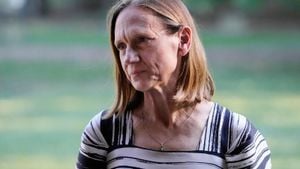Access to abortion services has emerged as one of the most contentious issues of political campaigns, drawing significant attention on both sides of the Atlantic. Recent developments highlight how political agendas and grassroots activism converge to create new realities for reproductive health rights. Across Scotland and the United States, the fate of abortion access is woven tightly with upcoming elections and societal movements.
Scotland has taken strides toward ensuring safe access to abortion services. The Scottish Parliament recently enacted the Abortion Services (Safe Access Zones) (Scotland) Act 2024, which establishes buffer zones around abortion clinics. These zones, set at 200 meters, seek to prevent harassment and intimidation of women seeking reproductive health services. This legislative change is seen as a significant victory for grassroots activism, particularly driven by the student-led group “Back Off.” Founded by Edinburgh University students, the initiative sought to block protesters from clinic entrances, aiming to create environments where women can access services without fear.
Of course, the passage of this act came on the heels of intense campaigning and public sentiment favoring women's rights and safety. Proponents, including Scottish Green MSP Gillian Mackay, have lauded the bill as transformative and have expressed hope for the end of protests targeting vulnerable patients. Their efforts reflect broader social movements prioritizing the rights and dignity of women seeking healthcare.
Meanwhile, the U.S. finds itself embroiled in its own fierce debates surrounding abortion access, especially as the country approaches the 2024 presidential elections. Vice President Kamala Harris has positioned abortion rights as central to her campaign, framing her potential presidency as one committed to protecting reproductive rights and reducing the burden of state laws limiting access.
The term “Roevember” has become popular as pro-choice advocates rally support for ballot initiatives geared toward safeguarding abortion access. Supporters of the movement believe it can facilitate sweeping changes across various states. Yet, amid this hope, stark realities persist. Many of the nation’s all-trimester abortion clinics are on the brink of collapse, facing significant funding cuts exacerbated by recent political shifts and public policy changes.
One notable facility, the DuPont Clinic in Washington, D.C., has reported substantial financial losses, citing strict caps placed on patient funding. These financial strains have led clinic directors to voice serious concerns about the sustainability of their operations. "Even though technically the clinic is for-profit, we were never profitable," shared Karishma Oza, the clinic’s director of care coordination, emphasizing the dire need for funding to prevent closures. The symptoms of this funding crisis affect not only healthcare providers but also patients, who may find themselves needing care later due to delayed access.
Contrary to the optimism surrounding pro-choice political candidates, the loss of operational clinics could mean more individuals being denied abortions, particularly as state bans push abortion seekers to seek care later during their pregnancies when options may be limited. This paradox is starkly visible: as electoral victories are celebrated, structural issues within abortion care infrastructure linger, risking patient access.
According to recent studies, over 250 additional infant deaths have been reported monthly since the Dobbs decision, often linked to babies diagnosed with congenital anomalies. This increase sheds light on the extent to which the battle over reproductive rights transcends political lines and directly impacts public health. When women are denied access to necessary healthcare, it creates cascading consequences for their families.
The impact of these trends isn't lost on those fighting for reproductive rights on both sides of the ocean. Many activists and healthcare providers are increasingly wary of relying solely on political momentum to sustain abortion access. Dr. Diane Horvath, co-founder and chief medical officer at Partners in Abortion Care, expressed anxiety about the long-term effects of funding cuts, stating, “The financial barrier to reentry is really, really significant.” Her sentiments echo the larger concern embodied by healthcare confrontations, reiteratively showcasing the symbiotic relationship between political action and public health outcomes.
The Back Off campaign's triumphs signal the power of collective action, showcasing how communities can mobilize to demand legislative changes. Yet, competing arguments emerge from groups such as 40 Days for Life, who assert their peaceful intentions near clinics, contending their presence is rooted in compassion. This debate reflects the wider contention around abortion, testing the delicate balance between free expression and access to care.
With the elections intensifying, many are emphasizing the importance of immediate action to support abortion access. Various organizations encourage supporters to donate directly to clinics or local funds, stressing the urgency of the current climate for reproductive rights. The narrative leading up to the elections is bittersweet—a concerted push for progressive change alongside the looming risks of clinic closures and reduced access to care.
Both the U.S. and Scotland stand at crossroads; the outcomes could lead to vastly different futures for abortion access and women's healthcare rights. Activists on both sides are crying out for recognition of these shaping forces—both socioeconomic and political—impacting everyday lives. Recognizing the intersection of activism and policy exists as nations grapple with their health frameworks against the backdrop of mounting societal expectations.
Women, whether they are seeking care under increasingly restrictive conditions or fighting back against anti-abortion protests, deserve acknowledgment—not just as patients but as individuals with rights entitled to protection and agency over their own bodies. Visibility shines light on the path forward, wherein political campaigns and grassroots efforts may align toward creating sustainable changes.
No matter the electoral outcome, the onus remains on society to confront these fundamental questions about healthcare access, rights, and the value of women's health. It is clear to many advocates: change cannot rest solely on the ballot; it must be reflected structurally within the healthcare system to avert continuing crises.



